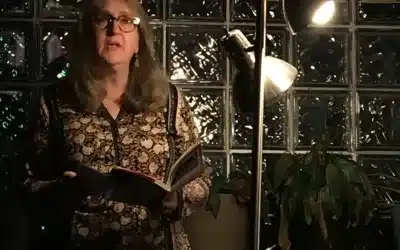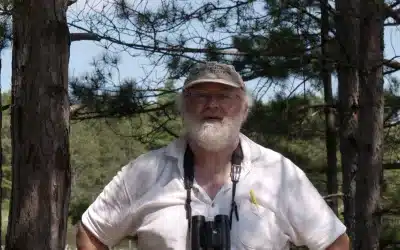Gerald Fleming is the author of the poetry collections The Bastard and the Bishop, One, Night of Pure Breathing (all three published by Hanging Loose Press), The Choreographer (Sixteen Rivers Press, 2013), and Swimmer Climbing onto Shore (Sixteen Rivers, 2005). His work has appeared in many magazines over the decades, including New Letters, Michigan Quarterly Review, Hanging Loose, Carolina Quarterly, New World Writing, Volt, Paris Lit Up, and Versal. Fleming edited the print magazines Barnabe Mountain Review and Forward to Velma, the vitreous magazine One (More) Glass, and The Collected Poetry & Prose of Lawrence Fixel (Sixteen Rivers, 2021). He has written numerous books for teachers, including Rain, Steam, and Speed (Jossey-Bass/Wiley, 2005), and lives most of the year near San Francisco, part of the year in Paris.

Hanging Loose Press: What are this past year’s accomplishments that you are most proud of?
Gerald Fleming: This answer might not be as literary as you’d hoped for. My wife and I moved into a new/old home in the San Francisco Bay Area last year, it didn’t have a proper private place in which I could write, therefore right away I built a room in the basement—two lovely windows looking out on a patio, soundproofed so that when I say poems as I’m trying them (or yelling at them when they’re bedeviling me) or playing music during revision, no one can hear. Finished that room a few weeks ago, then (obsessively, I guess) built a cherrywood & poplar desk for it, now stocking the room with books from the ninety-something boxes of books we moved over here. (Having to cull, too, and as you know it’s painful.)
More directly literarily, while “proud” might not be the word, satisfied that as the years accrete I seem to be steady as ever, no signs of the writing slowing down. Knock on wood. (Oh ye readers of this under sixty: you think life has gone fast? Just wait: post-sixty, it’s a goddamn linear accelerator.)
HLP: I am enamoured with all the metaphors/parallels of your carpentry/building your house and your writing. The details of soundproofing, your cherrywood and poplar desk which you built, the nitty gritty of the plumbing, electrical, etc. Would you say you approach crafting poems in a similar way that you would approach craft work on a house?
GF: Am tempted to push the metaphor far, e.g., re soundproofing, say, “A writer needs silence in the padded cell of his own brain,” or, re carpentry, riffs on plumb & level, tight joints, or in plumbing the importance of flow or some damned thing, or electrical, the importance of circuits that can handle the load, etc. But the reality is that making things gives my mind a rest— and if not a rest, certainly pushes me toward a different obsessiveness that gives other obsessions a temporary space in which to breathe. Am convinced that that breathing space has been essential to my work over the decades now.
Further, though, I do think there’s a connection regarding craft. That desk I mentioned: I’ve got it in the room but am not happy with how I sanded the edges. Usually I like to sand furniture to 400 grit, and it’s becoming obvious that the edges somehow only went down to 100 or so, and it’s driving me nuts when I sit down at it, run my hands over it. So next week will pull it out and take it down to 400, which will mean putting another coat of finish on it. Then I can sit there without a simmering self-loathing.
As a metaphor, this isn’t too far off. All of us poets know that we sometimes work poems obsessively—even ones that we later come to see are dead on the page. I’m in plenty of company, certainly, in offering the fact that for some poems there’s a stack of drafts thirty or forty deep. For others, fewer drafts, all depending on complexity of material and when to say “enough.” And even after that “enough” (viz: that desk) one wants sometimes to reel poems back from books or magazines they’ve appeared in, cut a line, change a word, or repudiate the whole thing, think it an irritant.
Also very happy with the most recent HL book, The Bastard and the Bishop. I think it’s a good book, and working with HL has been such a delight for years. Deep love there.

HLP: Yes! Hanging Loose is lucky to have you as an author! Any particularly difficult experiences/challenges for you recently? And how did you work through them?
GF: Again, a less-than-literary answer. The house we sold we’d lived in for forty-six years. It was a complex property: four ramshackle wooden buildings when we moved in (1975) on two acres, a semi-rural village (Lagunitas) thirty miles from San Francisco. Deciding to sell it was difficult, on my part because over those forty-six years I’d worked on every building: learned carpentry, electrical, plumbing, roofing, etc. (because no $: public school teachers). By the time we left, it was lovely, and I came to realize it’d been a life’s work: the design, the eccentric touches. As we were leaving I realized that my hands had touched almost every surface of the place: every stick of wood, every stone in every wall. The whole thing was rather archetypal for me, deeply embedded.
So the difficult challenge of the last year has been, after moving, to apprehend/integrate the “loss” of that place where our kids were raised and that work was done and so many books written.
How it’s turned out has been surprising. I haven’t missed the old place/grieved as much as I’d expected. We’re less anxious about forest fires, floods, constant maintenance (a forest is always reclaiming, and wood after all is cellulose), and driving at least an hour round-trip for goods & services. At this point I’m distrusting that benign surprise a bit, hoping that some psychological bulldozer doesn’t come rolling over me tomorrow. But the new place will afford more time for writing, and I’m in the Last Run, apparently (I hope that that Last Run can yield twenty more years, but, alas, am familiar with actuarial tables), and… we’ll see.

HLP: What are three books you’ve read recently that have made an impression on you?
GF: Do I have to keep it at just three?
HLP: You’re in good company! This is a tough call for many poets!
GF: I tend to have quite a few going at one time. Right now I’m loving Carl Phillips’ My Trade is Mystery, Terence Winch’s That Ship Has Sailed, and, though I admit I have some pieces in it, Dreaming Awake, a new anthology of prose poems edited by Peter Johnson here in the U.S. and Cassandra Atherton in Australia. It’s really one of the best of its kind. Also, having made the crazy decision to go to AWP recently, I picked up, at the recommendation of my friend Miriam Bird Greenberg (terrific poet), Brandon Son’s Tripas. It’s glowing there on the table, as is Dante DiStefano’s Midwhistle. Finally, my pal Ellery Akers sent me In the Same Light: 200 Poems for Our Century from the Migrants & Exiles of the Tang Dynasty, translations by Wong May, which I’ve been dipping in & out of and greatly enjoying.

HLP: What are your upcoming projects?
GF: A few, really. Am putting together another collection of prose poems, finishing (I hope) a Paris book (we have a small place there), and at this moment wrestling with a long poem that I’m liking but that hasn’t come true yet.
HLP: Can you talk a little bit about your “Paris” persona/existence? Are there tones of being an expat when you are there? And the inspiration for your Paris book.
GF: I don’t really have a Paris “persona” when I’m there—beret, smoking Gauloises, etc.; am pretty much the same schmuck I am here in the States. And wouldn’t describe myself as a “Francophile,” either—just someone who loves that city, has loved it since the Sixties. My wife & I & my brother & sister-in-law bought the place (a small apartment in Montmartre) twenty years ago, when real estate was quite inexpensive. We split it two ways, so could afford it that way. And don’t consider myself an expat, though I’d love to have a European passport—political exigency reasons. We do have a good number of friends there (some very dear), and culturally the city is the richest place I know, constantly changing (2K+ years of such transformation), and vital/visionary in the most important of ways societally. I get a lot of writing done there, focus well, and there’s a rich literary scene, readings, mags, and of course the magnificent libraries. It’s a place to live, keeps me on my toes.
As far as the Paris “existence,” it, too, is similar to here, but… it’s in Paris. We shop for groceries (supermarkets offer more varied, higher-quality-EU-standard food & products, and the open markets of course are superb), walk (best city in the world for that), catch a lot of music (all genres), spend time in those above-mentioned libraries, there’s the never-ending rotation of museum shows (more than a hundred museums there) see friends, use the city as an ideal hub from which to travel other places (prices are great), use the magnificent train system within the country, spend time in cafés, change plans because of strikes, work on the apartment when it needs it, read for concentrated periods of time, write. (Oh, and some wine’s involved.)
As to the Paris book, it’s not poetry. If I called it a series of vignettes, that would do it a disservice. Some short pieces, some longer, as in perhaps an essay on the Bataclan slaughter or the shuttering of a particular jazz club, other writing over many years. I haven’t sent it anywhere yet (it needs tweaking), but hope to by the end of the year.
HLP: I am intrigued by your “wrestling with a long poem that I’m liking but that hasn’t come true yet.” Can you describe what Gerald Fleming wrestling with a long poem looks like? Also, the classic question: “How do you know when a poem is finished (or come true?)”
GF: What wrestling with a poem looks like: at one corner of the ring is an old guy, baggy blue swim trunks, skinny white legs, Speedo shirt because he doesn’t want to show his old man’s chest, unkempt hair. At the other corner, this oddly misshapen creature, body scarred with strike-throughs, numbers tattooed all over, the numbers rearranging themselves as if to confuse the opponent. They’re both glowering. The referee looks like a more dignified version of the old guy, he’s got his black & white uniform on (bow tie), but he looks exhausted, ready to go home to a late meal. Doesn’t care who wins: just get this thing over.
In the non-brawling sense, though, the usual for most writers. Getting the poem to go somewhere that at first rises from somewhere (associations, the unconscious) then must be made into form, into content. Dry talk, that description. But one wants the poem not to be dry, wants it to enter the human realm, touch even if delicately on the universal, waste no words (why waste the reader’s time?), therefore guard vs. the prolix, & while you’re at it, vs. the maudlin & cornball & egomaniacal & neat endings, and all the while—for me, at least—seeking strong music, poems that come off the tongue felicitously. Does that make sense? It’s reductionist, as you know, but seems a rough summary.
As to the “How do you know a poem is finished?” question, I keep thinking of a Calder film I saw years ago. When they asked him “How do you know a sculpture’s finished?” He said, “When it’s dinner time.”
In my case, sometimes I just know—it has a sense of homeostasis, a sense of being true—sometimes I abandon it because I’m beginning to hate it (then go back in a few months to revisit, see it more clearly, then either trash it or make it right), sometimes I stop working on it because writer pals tell me to stop working on the goddamn thing, it’s thrice-baked, it’s done, and on rare occasions it’s an editor who weighs in. One example is from the latest Hanging Loose book, The Bastard and the Bishop. [HL editor] Dick Lourie & I were talking on the phone, we were talking about artists, both love Magritte, Dick said he’d love to see me write a prose poem in response to a Magritte, so I did, and we had a nice back-and-forth about it, and it worked out well, I think.
Thanks to Dick, a few more (not in Bastard and Bishop) have emerged.

Read some of Gerald Fleming’s poems from The Bastard and the Bishop at: https://bit.ly/gfleming
And buy a copy at https://bit.ly/buygeraldflemingbook





